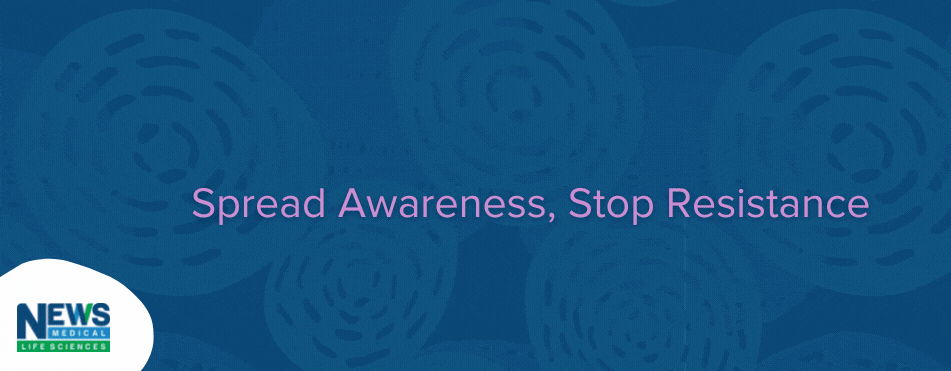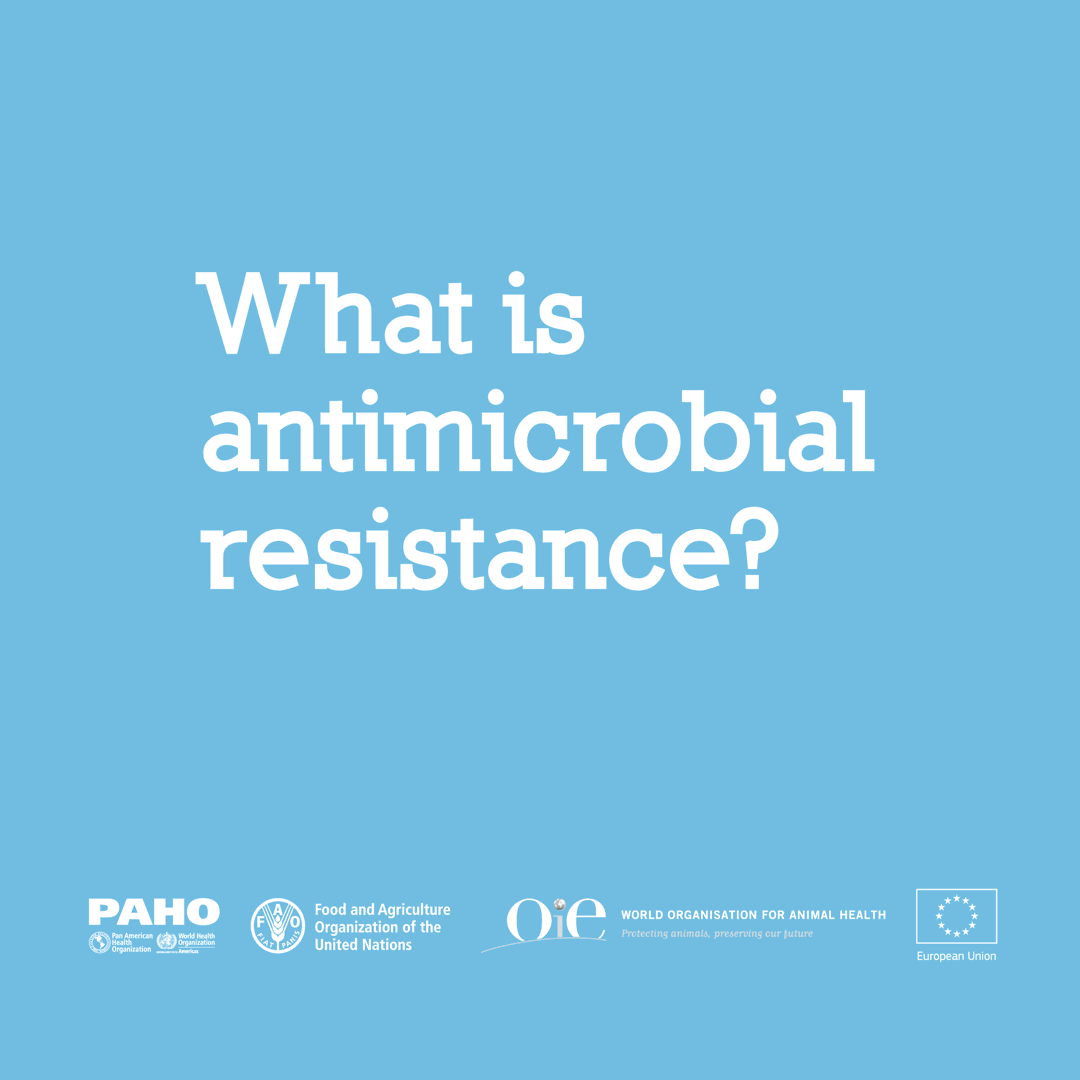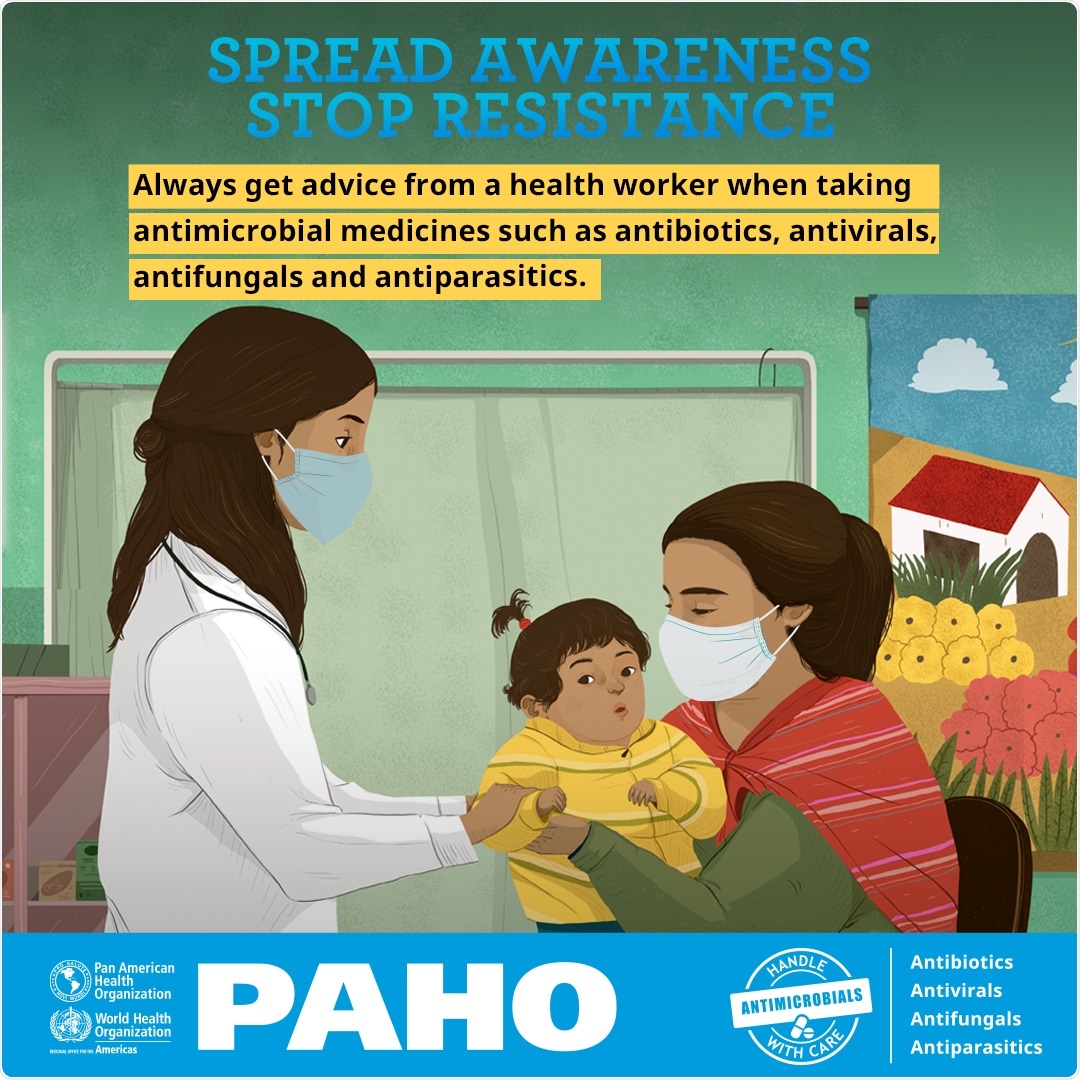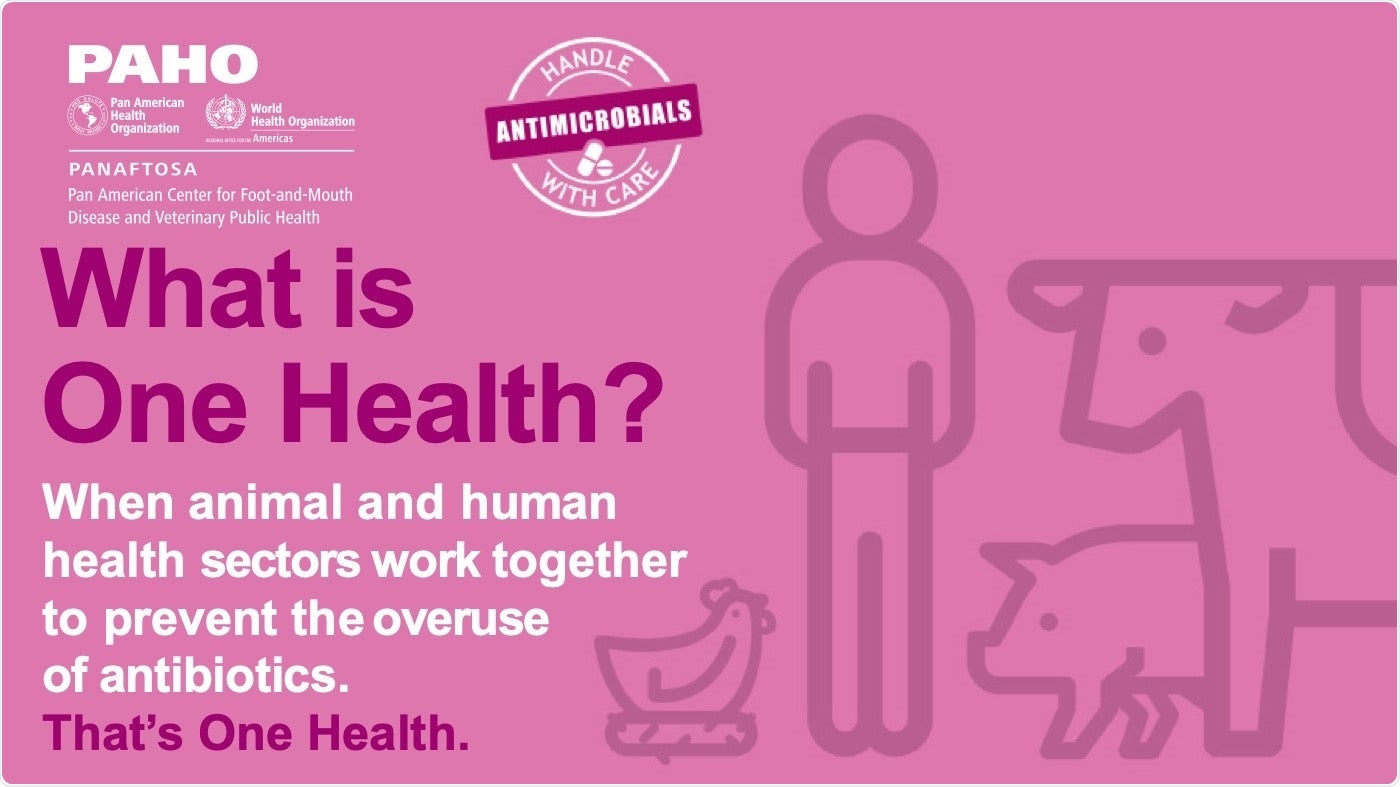I am a medical doctor by training and cannot remain unmoved by the fact that people are dying of bacterial infections in the 21st century. Antibiotics are losing their effectiveness due to a number of factors, including their inappropriate use.
My role in PAHO is to coordinate the Special Program on Antimicrobial Resistance (AMR). We have a team in Washington D.C. and consultants in our Latin American and Caribbean country offices to support countries in their interventions to contain AMR.
I conduct policy dialogue and operations with Latin American and Caribbean health authorities responsible for planning, programming, and implementing strategies to support countries to carry out and scale-up national responses on AMR.

Every year you celebrate World Antimicrobial Awareness Week (WAAW) with the aim of increasing awareness for antimicrobial resistance (AMR). What is the importance of helping to raise awareness of AMR in an ever-changing world?
Although AMR is a leading global public health threat, many policymakers, professionals, and the general public often remain largely unaware of it. In an effort to improve global visibility of this health priority, individuals, communities, and organizations are invited annually to join a campaign to build awareness of AMR. The campaign encourages actions among the general public, health workers, farmers, animal health professionals, and policymakers to prevent the further emergence and spread of drug-resistant infections.
Celebrated 18-24 November each year, the WAAW campaign is led by the agencies of the Tripartite at the global level (FAO, OIE, WHO), providing key themes and guidelines that allow countries to encourage and guide their actions in this area.
Awareness is the first step for citizens, individuals, youth, adults, elderly, health professionals, veterinarians, pharmacists, and educators to understand the importance of preserving antimicrobials. We are at risk of losing them, and this can affect everyone's life.
AMR is more relevant than ever[i], as we are living in an aggravating context for it, due to globalization, demographic changes, social changes, increased trade, mobility, and environmental impacts such as degradation of land and water, disruption of ecosystems, and the climate crisis. The GOP26 climate summit in Glasgow provided an opportunity for gathering experts on climate and AMR to discuss the transdisciplinary integration of development practices and policies.
The theme for WAAW 2021 is ‘Spread awareness, stop resistance’. What is the aim of this message and what more can people do to get involved and help stop the spread of drug-resistant infections?
The theme is a play on words: The resistant bacterias spread among people, animals, and the environment, but if we spread awareness about the risk of AMR and take action, we can stop resistance.
With the theme “Spread awareness, stop resistance,” we want to encourage stakeholders in human, animal, and environmental health to be AMR awareness champions in their families, communities, and places of work. We want all to engage with the global campaign activities, organize events that increase knowledge about AMR, and spread awareness about household, workplace, community, and/or governmental action that can affect its control or spread.
The theme is fully applicable under the One Health approach: 140 stakeholders from animal, environmental, and human health sectors submitted their suggestions for a global theme. The final theme was selected from among these suggestions by AMR focal points from the Tripartite’s headquarters and regional offices.

Image Credit: PAHO
The overarching slogan for WAAW is ‘Antimicrobials: Handle with care’. What is meant by this message and how has the inappropriate handling of antimicrobials contributed to AMR?
This slogan – Antimicrobials: Handle with Care – has been the overarching slogan in previous years as well. Antimicrobial resistance may occur naturally, but inadequate use of antimicrobials accelerates the process, leading to the selection and spread of resistant bacteria in communities, hospitals, and the environment..jpg)
We know that inappropriate handling of antimicrobials and misuse or overuse in humans or animals are the main drivers for antimicrobial resistance. Antibiotic consumption data shows that there is a huge variety of behaviors among countries. But the data consistently points out the need to take actions to ensure the appropriate use of antibiotics. These include enforcing prescription-only policies and implementing antimicrobial stewardship programs.
Second, to inappropriate handling or misuse of antimicrobials, healthcare transmission also drives AM because of breaches in infection prevention and control practices[ii]. And we know that antimicrobial consumption is increasing all over the world, especially in emerging economies [iii].
The World Health Organization (WHO) has declared that AMR is one of the top 10 global public health threats currently facing humanity. How can policymakers, governments, and the general public all work together to help reduce this threat and tackle AMR?
Everyone can take action to contain AMR. Policymakers and governments can have a huge impact on the response to AMR. Recently, the UN established the Global Leaders Group on AMR[iv], whose mission is to “collaborate globally with governments, agencies, civil society, and the private sector through a One Health approach to advise on and advocate for political action for the mitigation of drug-resistant infections through responsible and sustainable access to and use of antimicrobials.” This is an innovative approach, including members not only from governments but also from civil society and the private sector.
The Global Leaders Group will inspire and advise policymakers to ensure that robust national action plans are in place to strengthen policies, programs, and implementation of infection prevention and control measures; regulate and promote the appropriate use and disposal of quality medicine; and make information available on the impact of antibiotic resistance.
Along with human and animal health professionals, individuals can also help prevent and control the spread of antibiotic resistance by only using antibiotics when prescribed by a certified health professional; following health workers’ advice when using antibiotics; and preventing infections by regularly washing hands, preparing food hygienically, avoiding close contact with sick people, practicing safer sex, and keeping vaccinations up to date.
Are there any factors that have contributed to the increased threat of AMR? If so, can you describe what they are?
As I said, we are living in an aggravating context for AMR because of globalization, demographic changes, social changes, increased trade and mobility, and environmental impacts.
At the same time, there is solid evidence of the increase globally of antimicrobial consumption in humans and animals, which is the main driver for AMR. Antibiotic consumption in humans increased by 65% between 2000 and 2015, whereas consumption in animals is expected to increase by 11.5% between 2017 and 2030[v].
If these trends continue, antimicrobial consumption is likely to increase worldwide by 200% between 2015 and 2030. That would place enormous ecological pressure on bacteria, increasing the selection of resistant ones.

Image Credit: PAHO
How has the ongoing COVID-19 pandemic impacted AMR?
With the advent of the COVID-19 pandemic, AMR continues to gain ground, fueled by an increase in the use of antibiotics to treat COVID-19 patients. The increase may be due to concerns about bacterial co-infections and the difficulty differentiating between COVID-19 and bacterial infections early in the pandemic; disruptions to infection prevention and control practices in overwhelmed health systems; and diversion of human and financial resources away from monitoring and responding to AMR threats.
Moreover, AMR is likely to have caused more COVID-19 deaths, as secondary bacterial infections can worsen the outcome of severe and critical COVID-19 illness. An unprecedented increase in bacteria that harbor resistance mechanisms in Latin America and the Caribbean led PAHO to issue an epidemiological alert in the past month. The alert emphasizes the importance of appropriate microbiological diagnosis and effective, articulated implementation of infection prevention and control programs, as well as regulations for the optimal use of antimicrobials[vi].
While most countries in the region had made significant progress since 2015 in developing and implementing National Action Plans on AMR under a One Health approach, the COVID-19 emergency deprioritized planned activities and diverted human and financial resources that had been contributing to antimicrobial resistance surveillance and response activities, channeling them instead to the pandemic response.
With more than 86 million COVID-19 cases and 2 million COVID-19 deaths, the region of the Americas is the most severely affected WHO Region to date. Particularly in Latin America and the Caribbean, healthcare capacity has been exceeded, resources are exhausted, and poverty and inequalities are on the rise in every country.
As AMR becomes exacerbated by the COVID-19 pandemic, it is more urgent than ever to prioritize efforts to contain it. We must ensure that resources are allocated to preventing, detecting, and responding promptly to the emergence and spread of new multidrug-resistant pathogens. We must invest in optimizing antimicrobial prescribing and use, and advocate for research and development in infection diagnostics and treatment. And we must continue to monitor the impact of the COVID-19 pandemic on AMR epidemiology in the region.
It is said that to tackle AMR a ‘One Health Approach’ is needed. Can you describe what is meant by this and how it would work?
The causes and impacts of AMR are linked to human, animal, and environmental health. There are resistant microorganisms in humans, animals, food, and the environment that can move in the ecosystem. The main driver of this resistance is the use of antimicrobials in human, animal health, and food animal production. Therefore, addressing AMR requires a holistic and multi-sectoral approach – referred to as the “One Health” approach.
One Health promotes coordination and collaboration of human, animal, plant, and environmental health programs, aiming to improve prevention and response of health threats, such as AMR, that arise from the interconnection between humans, animals, and the environment.
Solutions implemented through the One Health approach gather diverse specialties to work together. By designing and implementing multi-sectoral programs, policies, legislation, and research with individuals working in human, terrestrial and aquatic animal and plant health, in food and feed production, and environmental issues, AMR can be effectively addressed and broadly communicated to achieve better One Health outcomes.

Image Credit: PAHO
Are you hopeful that one day we will see a world without AMR?
Bacteria are naturally resistant. As a result, resistant bacteria have been around for as long as bacteria have existed. It is the use of antimicrobials by humans that has exponentially increased AMR. Bacteria have been around for the last 1.8 billion years, but only in the last 80 years, since the discovery of penicillin, has AMR increase. Given that antimicrobials will continue to be used, AMR will be with us as long as there are infectious diseases in the world.
However, I am hopeful to see a world less burdened by infectious diseases due to universal access to new diagnostic technologies and effective antimicrobials, and quality health services. I work every day so that infectious diseases do not cause death and disability in the next generations all over the world and particularly in Latin America and the Caribbean. I hope that one day this will be a reality.
Where can our readers go to find out more information about World Antimicrobial Awareness Week 2021 and get involved in this campaign?
Additional information can be found in:
We invite everyone to drive AMR awareness-raising ahead by bringing blue to their online presence, physical communities, workplaces, governments, and cities throughout the WAAW week.
On 24 November, the final day of WAAW, the Tripartite organizations will encourage monuments and buildings around the world to light up blue to spark a global conversation around AMR. Join us – go blue, spread the word, and be part of the movement!
https://www.who.int/campaigns/world-antimicrobial-awareness-week/2021/go-blue-campaign
Countries, regions, organizations, and individuals celebrating WAAW are encouraged to join the discussions on AMR through their respective social media channels. The use of global hashtags will increase the outreach and amplify voices advocating for the appropriate use of antimicrobials.
Hashtags: #WAAW #AntimicrobialResistance #AMR #HandleWithCare
Follow the WAAW conversation of the Tripartite Organizations by connecting with our accounts:
PAHO
WHO
About Dr. Pilar Ramon Pardo
Pilar Ramon-Pardo, M.D., Ph.D., is the coordinator of the Special Program on Antimicrobial Resistance at the Pan American Health Organization (PAHO), the WHO Regional Office for the Americas..jpg)
After training as a specialist in internal medicine, she obtained her Ph.D. from the Complutense University of Madrid, with a thesis on antimicrobial resistance in Latin America. During the last 20 years, she has worked in the prevention and control of infectious diseases in different countries in Africa, Asia, and the Americas.
Currently, she is the coordinator and responsible for the planning, programming, and implementation of regional strategies to support Latin American and Caribbean countries in carrying out and scaling up national responses to antimicrobial resistance.